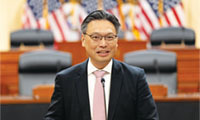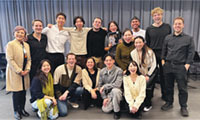The phenomenally gifted if wildly unconventional pianist Glenn Gould was a tangle of personal tics and complexes. Sometimes he seemed a provocateur bent on riling the public with extreme interpretations and odd behavior. Other times he came across as a fragile, fearful man, at ease only when making music.
“Genius Within: The Inner Life of Glenn Gould,” the fascinating new documentary by the Canadian filmmakers Peter Raymont and Michele Hozer, has won praise for providing insights into Mr. Gould’s eccentric character. It shows the sad progression of a brilliant, garrulous musician with a fiercely original artistic vision as he becomes increasingly obsessive and isolated. Yet it also provides valuable insights into the inner workings of Mr. Gould’s distinctive technique and unorthodox interpretive approach.
An only child, he studied piano with his mother until, at 11, he began lessons with the Chilean-born pianist Alberto Guerrero at the Toronto Conservatory. Mr. Guerrero was an advocate of a technical discipline known as finger tapping . He taught his students to hold one hand in a relaxed position on the keyboard, lightly touching the keys. With the other hand, the student would tap a fingertip enough to depress the desired key. The mechanical action of the key springing up would lift the finger back into place. The idea was to teach the fingers to play with a minimum of effort and no excess lift.
Mr. Gould sat low to the ground when he played, his preferred chair just 33 centimeters high. In this crouched posture, with his hands reaching up to the keyboard, his fingers do everything. Yet you cannot play the piano with just your fingers. Your arms, shoulders and back - even your feet must get into act as well.
That Mr. Gould’s astonishing playing lacked this bodily dimension comes through in the film, in a segment about his performance of Brahms’s D minor Concerto with Leonard Bernstein and the New York Philharmonic in 1962.
“You are about to hear a rather, shall we say, unorthodox performance of the Brahms D minor Concerto,” Mr. Bernstein began, with “frequent departures from Brahms’s dynamic indications.”
But he emphasized that there “are moments in Mr. Gould’s performance that emerge with astonishing freshness and conviction.”
The tempos in this performance are fairly broad. Yet in retrospect Mr. Bernstein must have been bothered by Mr. Gould’s other “departures” more than by the slow tempos. Brahms often wrote for the piano as if it were an orchestra. Here Mr. Gould tried to rid the piano part of orchestral thickness and purge the music of blatant expressive contrasts.
The film quotes Mr. Gould from a radio interview the next year saying he found Mr. Bernstein’s speech that night full of good spirit and thought the whole controversy was amusing.
That Mr. Gould, who died in 1982, was beloved by a circle of intimates comes through touchingly in the film. After Mr. Gould stopped giving public concerts at age 31 and confined his work to the recording studio, he spent countless hours with Lorne Tulk, an audio engineer, who carried out his painstaking editing demands, sometimes neglecting his children, he says.
One day Mr. Gould told Mr. Tulk that they should be brothers, that they should actually go to some office in Toronto and make it legal. Mr. Tulk, as he recalls in the film, gently answered, “I would love to be your brother, Glenn,” but “I have four brothers and a sister” who might want some say in the matter.
Mr. Gould thought this answer was very sweet, Mr. Tulk says. The subject never came up again.
스마터리빙
more [ 건강]
[ 건강]이제 혈관 건강도 챙기자!
[현대해운]우리 눈에 보이지 않기 때문에 혈관 건강을 챙기는 것은 결코 쉽지 않은데요. 여러분은 혈관 건강을 유지하기 위해 어떤 노력을 하시나요?
 [ 건강]
[ 건강]내 몸이 건강해지는 과일궁합
 [ 라이프]
[ 라이프]벌레야 물럿거라! 천연 해충제 만들기
 [ 건강]
[ 건강]혈압 낮추는데 좋은 식품
[현대해운]혈관 건강은 주로 노화가 진행되면서 지켜야 할 문제라고 인식되어 왔습니다. 최근 생활 패턴과 식생활의 변화로 혈관의 노화 진행이 빨라지고
사람·사람들
more많이 본 기사
- ‘하이테크 절도’ 기승… 고급차 눈 깜짝할 새 털린다
- 리얼 ID 없으면 45달러 내야… 수수료 대폭 올려
- 한인 초등생 ‘성적 괴롭힘’ 징계 논란
- [2026 북중미 월드컵 조 추첨 D-3] 한국 축구 대표팀 LA 경기 성사?… ‘관심 증폭’
- 의붓아들이 양부모 총격 살해 후 자살
- 백악관 올해 크리스마스 장식 공개
- 매장서 ‘메리 크리스마스!’… 착한 기업 리스트 선정
- 진세연·박기웅, KBS 주말극 ‘사랑을 처방해 드립니다’서 호흡
- ‘20분 의식불명’ 김수용, 임형준·김숙이 살렸다..응급처치 빛난 ‘의인’
- [BTS 솔라 디자인] “전기료 절감·집 가치 상승… BTS 솔라로 동시에”
- ‘돌싱 남편♥’ 최여진, 결혼 선배의 여유.. “착한 함은정, 좋은 짝꿍 만나 뿌듯”
- 관세·인플레 직격탄… 신차 ‘5만달러’ 시대 도래
- [리차드 호프만 변호사] “1,250만달러 승소의 능력… 한인사회 든든한 수호자”
- 올해 PGA 투어 우승 없이 임성재, 상금 순위 8위 올라
- 트럼프, 마두로에 ‘사임’ 최후통첩
- 미국 성인 3명 중 2명… ‘하나님은 영원 불변 존재’
- LA 레이커스, 7연승 질주… 돈치치·리브스 67점 합작
- 지드래곤, 상의 탈의+민낯으로..라이브 논란 ‘마마’ 대기실 어땠나
- 연말 샤핑시즌 ‘가짜사이트’ 온라인 사기 주의
- 현대차, 산타페 리콜 “후방카메라 설치 불량”
- 해외제출용 의료문서 한국, 공증 없이 발급
- 트럼프 “원전 르네상스”… 120조원 투입 생태계 재건
- 송성문 “MLB 진출, 아직 진전 없어… 윈터미팅 열려야”
- 한인은행 남가주 ‘무한경쟁’… ‘메트로 시티’ 가세
- ‘사이버 먼데이’ 매출 호황… 전년비 6.3%↑
- ‘소비자 신뢰지수’ 11월 하락세로 전환
- 한국차 관세, 11월 1일로 15% 소급 인하
- 애플, 글로벌 점유율 24% 사상 최고
- 이, 이번엔 시리아 공격… 트럼프 “대화 유지해야”
- 류준열, ‘응팔’ 10주년 단체 사진에만 없었다..가족과 함께 포착
- [화요칼럼] 카자흐스탄에서 만난 고려인
- ‘연애 인정’ 손수아, 母 이경실도 놀랄 세미 누드..금으로 장식한 몸
- [이슈 분석 - 카리브해서 무슨 일이] 마약운반선 생존자 사살 “전쟁범죄” 논란
- 한인 기업, 뉴욕시 대형 카지노 설립 승인
- 지속적인 높은 수요, 주목받는 ‘어뉴이티’
- 불시에 찾아오는 뇌경색… 재관류술 후 ‘이차손상’ 막을 해법 찾았다
- 작은 산불, 작은 질병, 그리고 작은 불황
- [존청 변호사의 “경제·법률 핫이슈”] 증여·상속 고민… 자녀에게 가장 유리하게 재산 물려주는 법
- OC에는 인재가 없나요?
- “쿠팡 못믿겠다” 와우멤버십 해지 속출… e커머스 판 흔들리나
- 쿠팡, SEC(증권거래위원회)에 “보안 강화” 보고했지만… 인력·투자 줄여
- 협치 없인 셧다운 매년 온다
- “달리기 중 갑자기 실신”… 소아청소년 심정지 위험 신호
- 정부에 수용권과 정당한 보상 이해하기
- 음반사, AI 음원소송 대신 라이선스 계약
- KYCC 홀리데이 카니발 13일 윌튼초등학교서
- 핵심 광물 구리 가격, 사상 최고치
- 홍콩 아파트 화재 사망 151명으로 늘어
- “AI 컴퓨팅 반년마다 2배로 확충”
- 20대 한인 여성, 포트리 세탁소 차량 돌진
1/5지식톡

-
 테슬라 자동차 시트커버 장착
0
테슬라 자동차 시트커버 장착
0테슬라 시트커버, 사놓고 아직 못 씌우셨죠?장착이 생각보다 쉽지 않습니다.20년 경력 전문가에게 맡기세요 — 깔끔하고 딱 맞게 장착해드립니다!장착비용:앞좌석: $40뒷좌석: $60앞·뒷좌석 …
-
 식당용 부탄가스
0
식당용 부탄가스
0식당용 부탄가스 홀세일 합니다 로스앤젤레스 다운타운 픽업 가능 안녕 하세요?강아지 & 고양이 모든 애완동물 / 반려동물 식품 & 모든 애완동물/반려동물 관련 제품들 전문적으로 홀세일/취급하는 회사 입니다 100% …
-
 ACSL 국제 컴퓨터 과학 대회, …
0
ACSL 국제 컴퓨터 과학 대회, …
0웹사이트 : www.eduspot.co.kr 카카오톡 상담하기 : https://pf.kakao.com/_BEQWxb블로그 : https://blog.naver.com/eduspotmain안녕하세요, 에듀스팟입니다…
-
 바디프렌드 안마의자 창고 리퍼브 세…
0
바디프렌드 안마의자 창고 리퍼브 세…
0거의 새제품급 리퍼브 안마의자 대방출 한다고 합니다!8월 23일(토)…24일(일) 단 이틀!특가 판매가Famille: $500 ~ $1,000Falcon: $1,500 ~ $2,500픽업 & 배송직접 픽업 가능LA…
-
 바디프렌드 안마의자 창고 리퍼브 세…
0
바디프렌드 안마의자 창고 리퍼브 세…
0거의 새제품급 리퍼브 안마의자 대방출 한다고 합니다!8월 23일(토)…24일(일) 단 이틀!특가 판매가Famille: $500 ~ $1,000Falcon: $1,500 ~ $2,500픽업 & 배송직접 픽업 가능LA…
케이타운 1번가
오피니언
 문태기 OC지국장
문태기 OC지국장 OC에는 인재가 없나요?
 민경훈 논설위원
민경훈 논설위원작은 산불, 작은 질병, 그리고 작은 불황
 박홍용 경제부 차장
박홍용 경제부 차장 협치 없인 셧다운 매년 온다
 김영화 수필가
김영화 수필가 [화요칼럼] 카자흐스탄에서 만난 고려인
 조철환 / 한국일보 오피니언에디터
조철환 / 한국일보 오피니언에디터 [지평선] 열린 시장의 닫힌 정책들
 이기철
이기철 ‘오늘’ 만큼 신선한 이름은 없다
 옥세철 논설위원
옥세철 논설위원중국이 전후 국제질서의 수호자라고?

기독교 박해, 날로 만연
 메건 매카들 워싱턴포스트 칼럼니스트
메건 매카들 워싱턴포스트 칼럼니스트 [메건 매카들 칼럼] 부정하기 힘든 학력 저하 신호
1/3지사별 뉴스

‘반이민’고삐…“모든 외국인 망명 신청 중단”
도널드 트럼프 행정부가 미 최대 명절인 추수감사절 전날(26일) 워싱턴DC 한복판에서 발생한 주방위군 겨냥 총격 사건을 계기로 모든 외국인의 …
20대 한인 여성, 포트리 세탁소 차량 돌진

VA 마리화나 소매 합법화 앞두고 찬반 논란
지난 버지니아 주지사 선거에서 승리한 민주당 아비가일 스팬버거 당선자는 내년 취임과 동시에 마리화나 소매 판매 합법화에 나설 예정이다.(본보 …
전 UVA 학생, 무기징역 5회·23년 추가형 받아

영주권 인터뷰 갔다가 ‘현장 체포’ 속출
미 시민권자와 결혼한 외국인 배우자들이 영주권 신청을 위해 마지막 절차인 인터뷰에 참석했다가 연방 이민 당국에 의해 체포되는 사태가 전국에서 …
피아니스트 조성진, 내년 1월 SF에 온다

오늘 하루 이 창 열지 않음 닫기 





















































.png)


댓글 안에 당신의 성숙함도 담아 주세요.
'오늘의 한마디'는 기사에 대하여 자신의 생각을 말하고 남의 생각을 들으며 서로 다양한 의견을 나누는 공간입니다. 그러나 간혹 불건전한 내용을 올리시는 분들이 계셔서 건전한 인터넷문화 정착을 위해 아래와 같은 운영원칙을 적용합니다.
자체 모니터링을 통해 아래에 해당하는 내용이 포함된 댓글이 발견되면 예고없이 삭제 조치를 하겠습니다.
불건전한 댓글을 올리거나, 이름에 비속어 및 상대방의 불쾌감을 주는 단어를 사용, 유명인 또는 특정 일반인을 사칭하는 경우 이용에 대한 차단 제재를 받을 수 있습니다. 차단될 경우, 일주일간 댓글을 달수 없게 됩니다.
명예훼손, 개인정보 유출, 욕설 등 법률에 위반되는 댓글은 관계 법령에 의거 민형사상 처벌을 받을 수 있으니 이용에 주의를 부탁드립니다.
Close
x